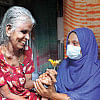The high cost of dying

"It seems dying is more difficult than living," an octogenarian relative of mine, who had just returned from visiting one of his terminally ill relatives, remorsefully observed. The thought has been troubling him for quite some time now, as he worries about becoming a burden to his family at the time of his passing. This selfless man has given everything to ease the lives of his near and dear ones. He is now concerned about a prolonged dying process, which can lead him to be at the mercy of others. The conversation ended in an appropriately optimistic tone, reassuring that he had created a solid support base through his good deeds over the years, who would stand by him at times of need.
However, the haunting concern over the high cost of dying is as real as death itself. High-tech interventions for dying patients are becoming more common than ever. There was a time—the kind of time that we read in novels or watched in black-and-white movies—when a doctor would simply prescribe a change of weather or moral support to the terminally ill. Modern medicine has equipped doctors with sophisticated technology to battle death, or at best delay or ease the process. The doctors can thus disperse hope for patients who have reached the final chapter of their lives. The desperation to cling to the hope of a few more precious moments with a cherished family member prompts the relatives to remain willing to exhaust financial resources. They succumb to their own emotional turmoil and the pressure of societal expectations, ensuring that they have done everything in their power to prolong a life.
In many instances, the healthcare industry exploits the emotions of the relatives of patients and suggests procedures that will increase their profit margins or justify their gaudy establishment. Doctors, consultants, nurses, and hospital administrators team up to prepare for the medical rites to prevent natural death as sedated patients in intensive care units technically thrive on digital monitors. Finally, when doctors announce the passing, families not only grapple with grief but also bear the burden of crippling debts caused by the exorbitant costs of medical interventions and obscure billing practices.
I know of a young man who had to work three shifts in a store for months in the US to pay off the loans that he took to cover the hospital bills of his father, who had to be kept in the ICU for nearly a month. During the ritual bath, the family noticed that the deceased's skin was peeling off, indicating that the patient had been dead for a while but was falsely declared alive. The doctors deluded the family by promising a delayed death, while the dutiful son assured his grieving mother and sisters that money would not be a problem.
Then there are those affluent others who would travel to foreign hospitals, albeit on chartered flights, to receive care in foreign currencies to console themselves that they did not compromise their love.
The other day, a female student of mine came to me to request a leave of absence. Tears streamed down her face as she explained that her in-laws had asked her to leave the house due to the extensive time she needed to spend with her mother diagnosed with cancer. Even the expenses at a public hospital were beyond her, as she was using private tutoring to pay for her daughter's education and her mother's treatment. Her family and future are in turmoil because she needs to be with her mother.
I know many families who have had to sell their properties to meet hospital bills. One such family member told me that they could have actually built a school in memory of the deceased with the amount they spent at the hospital. And the irony was that the patient's transfer to the ICU was caused by an infectious hospital bug that formed in the concealed oxygen system. While in that critical stage, medical professionals conducted numerous tests and specialists held board meetings to inflate the bill. These are common medical practices, and there is no one to see or protest. If attendants complain or express their concerns, they will be requested to withdraw their patients. Dying becomes dubious.
Rarely are patients given the option to choose their transition. Palliative care, a humane and compassionate approach to end-of-life care, often takes a backseat in the relentless pursuit of life-prolonging measures. The emotional weight of making decisions about when to move from curative treatments to palliative care is a delicate one. Choosing comfort and quality of life may be seen as abandoning their loved ones, causing families to struggle with guilt and uncertainty.
I think there is scope for serious research on the finances involved in this medical rite involving the last days of a patient. According to an episode of 60 Minutes, in 2017, the American healthcare system "paid $55 billion just for doctor and hospital bills during the last two months of patients' lives; that's more than the budget for the Department of Homeland Security or the Department of Education, and it's been estimated that 20-30 percent of these medical expenses may have had no meaningful impact."
In the absence of a health insurance system in our country, a similar amount is actually coming from patients. The cost of living is so high that we can hardly afford to think of dying. And when the time comes, we seem unprepared or underprepared. There is hardly a day when you don't get an appeal for crowdfunding for the people that we know. The desire to stand by the dead or the dying makes us human. However, the quicksand of a medical system that promotes medical myth by delaying death engulfs and obscures this humanity.
In terminal cases, can we not shift our focus towards concretising the memory of the deceased in a more meaningful manner? Instead of investing exorbitant amounts in medical interventions with marginal benefits, redirecting those resources towards creating lasting memorials, such as charitable foundations, scholarships or community projects, can serve as a meaningful tribute to the departed.
I think the time has come for us to foster open conversations about death and embrace palliative care as an integral part of the healthcare system. We need to do serious research on the emotional and financial burdens associated with the end of life. Education and awareness about the options available, as well as promoting emotional support for families navigating this challenging time, can contribute to a more compassionate and dignified approach to death.
Dr Shamsad Mortuza is a professor of English at Dhaka University.
Views expressed in this article are the author's own.
Follow The Daily Star Opinion on Facebook for the latest opinions, commentaries and analyses by experts and professionals. To contribute your article or letter to The Daily Star Opinion, see our guidelines for submission.

 For all latest news, follow The Daily Star's Google News channel.
For all latest news, follow The Daily Star's Google News channel. 











Comments